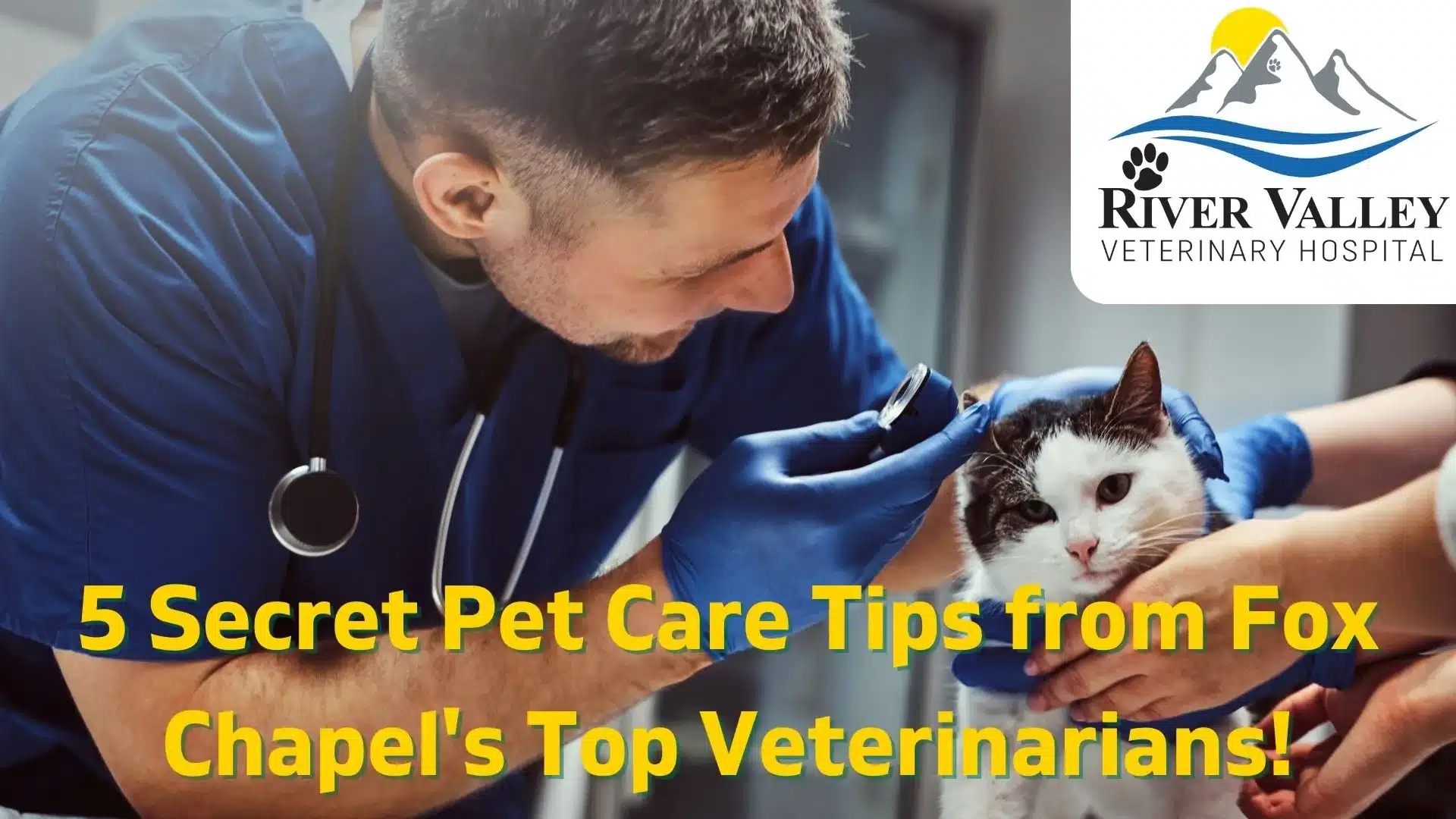5 Secret Pet Care Tips from Fox Chapel’s Top Veterinarians!
Hello, Fox Chapel pet parents – Dr. Richard Linkenheimer here! As a seasoned vet at River Valley Veterinary Hospital, I’m thrilled to share Top Veterinarian Tips Fox Chapel for your beloved pets.
1. Understanding Your Pet’s Nutrition – The Right Diet for Optimal Health
One of our favorite Top Veterinarian Tips Fox Chapel is choosing the right food. It’s actually crucial to your pet’s overall health. Consider age, breed, and health conditions to tailor your pet’s diet. When you bring your cat or dog to our veterinary clinic, we can help you find the best food for your pet. We even have samples, so you can test out various types to ensure your pet loves it, without having to buy a large bag.
2. The Importance of Exercise – Keeping Your Pet Active
Regular exercise is is a vital component of your cat or dog’s physical wellbeing, but also healthy for them mentally as well. That’s why it’s so important that pet owners find fun ways to keep them moving! Dogs love going for walks, both on and off leash. Take them to an agility course, it combines exercise with problem solving. For cats, look for toys and enrichment activities that will keep them moving while staying engaged, like a running wheel, interactive toys, or try leash training. Many cats get used to it very quickly, and love exploring the outdoors!
3. Mental Health Matters – Stimulating Your Pet’s Mind
As mentioned in the earlier tip, mental stimulation is as important as physical exercise. Interactive toys, and puzzles engage their minds, keep them engaged, keep their minds sharp. Also, pets who don’t have enough mental stimulation become bored, and get anxious, or seek mental stimulation, like chewing or scratching up shoes and furniture.
Dogs love lick mats, or snuffle boards that encourage them to use their brain and reward them with treats. There are many puzzle toys, or save money and simply create a game of hide and seek for your dog right in the home. Cats love toys that encourage pouncing and chasing. They love playing hide and seek in boxes, or just batting around a crumpled piece of paper.
4. Regular Health Check-ups – The Value of Preventative Care
Regular vet visits can catch health issues early. We at River Valley Veterinary Hospital are committed to your pet’s health. We recommend you bring your puppy or kitten in as soon as you adopt them (around 6-8 weeks), and bring them in at 10-12 weeks, 16-18 weeks, then at 1 year. Annual visits are great until they become seniors, and then twice a year will allow us to stay on top of any age-related problems. This schedule will help prevent health problems and illnesses, rather than try to treat them after they become sick. This is one of our most important Top Veterinarian Tips Fox Chapel.
5. Socialization Skills – Nurturing Your Pet’s Social Side
Proper socialization can prevent behavioral issues. Start slow and always monitor your pet’s comfort level. Gradual and positive exposure to various experiences, environments, and beings is vital to socialization. Start with controlled interactions, using a leash for dogs or a safe space for cats, to prevent overwhelming them. Introduce new experiences slowly and pair them with positive reinforcements like treats or praise.
For cats and dogs meeting each other, begin by allowing them to smell each other from a safe distance, such as across a door or with one pet in a crate. Always supervise interactions and look for signs of stress or fear. Consistency and patience are key in helping your pet become well-adjusted and comfortable in diverse situations.
6. Understanding Your Pet’s Health Needs – Regular Vaccinations and Preventive Medications
Vaccinations are vital in preventing serious diseases in pets. Don’t forget about flea, tick, and heartworm prevention too. Consult with our veterinarians at River Valley Veterinary Hospital for how often you should bring your furry family members in for their vaccinations. Indoor and outdoor animals will require different vaccinations.
7. The Role of Grooming in Health – Grooming is More Than Just Looks
Regular grooming helps identify skin issues, lumps, or parasites early. Plus, it’s a great bonding time! Whether your cat or dog is a long-haired or short-haired breed, make sure you know what your pet needs for grooming on a regular basis. Long haired dogs should be brushed down to the skin daily to prevent matting and bathed monthly. Short haired dogs need to be brushed monthly and bathed quarterly.
For cats regular brushing is very important to brush out hair clumps and brush out dirt, dust and debris while spreading healthy oils throughout their coat. Short haired cats should be brushed weekly, and long-haired cats should be brushed daily. Cats don’t need baths unless they get into something dirty that can’t be brushed out, because they will groom themselves.
Other grooming activities include trimming your cat or dog’s nails. Cats will typically need their nails trimmed every 3 weeks on average. When their nails are long enough to be curved and quite sharp, and trimming them will simply dull the nail, so it’s not as damaging to your furniture, while helping your cat prevent getting caught in carpets and blankets. It’s also important to note that cats will shed their claws every two or three months. They will be growing new nails underneath, and the old nail sheath will be shed when your cat uses a scratching post, or sometimes they will bite and pull the old nail off, revealing the new nail underneath.
Dogs on the other hand will need their nails trimmed approximately once a month, depending on how fast their nails grow. You will want to cut their nails so that they don’t touch the floor when your dog is standing.
Importance of Dental Care – Don’t Ignore Dental Health
Dental problems can lead to other health issues. Regular dental check-ups and cleanings are key. Best practices for dental care have owners start introducing a toothbrush into their pet’s mouth when they are young, and slowly start the brushing motion, and then adding pet friendly toothpaste. There are also dental chew toys and treats designed for oral health. We also have additives to put in their food or water that will slow the progression of tartar build up. During your regular check up, we will check your pet’s teeth, and let you know if we recommend a cleaning.
Understanding Pet Behavior
Behavioral changes can be a sign of underlying health issues. Always observe and consult us for unusual behaviors.
Balancing Indoor and Outdoor Time – Safe Outdoor Access
While outdoor time is beneficial, ensure it’s safe and controlled to prevent accidents and exposure to diseases. If your cat or dog will be spending any time outside, whether just in the yard or on a leash, let us know so we can ensure they have the right vaccinations and treatments, like tick and flea medication.
Pet Nutrition and Weight Management – Keeping a Healthy Weight
Obesity in pets can lead to numerous health issues. We can help create a balanced diet plan, and help you find ways to get your pet active, that will be beneficial not only for your pet’s body and mind, but yours too!
Managing Senior Pet Health – Special Care for Aging Pets
Senior pets have different health needs. Regular check-ups and tailored care are important. Aging pets are more likely to have eyesight and hearing problems, as well as stiff joints and muscles that can benefit from specific treatments or therapy. We like to ensure they’re on age appropriate food as well.
Emergency Care and First Aid
Know the basics of pet first aid
Stay Calm: Your pet can pick up on your emotions, so staying calm can help keep them calm too.
Safe Approach: If your pet is injured, they might be scared or in pain and could act unpredictably. Approach them slowly and speak calmly.
Assess the Situation: Quickly assess your pet’s condition. Check for visible injuries, breathing difficulties, or signs of pain.
Contact Your Veterinarian: In case of any emergency, your first action should be to contact your veterinarian or an emergency vet clinic. They can give you immediate advice over the phone.
Stopping Bleeding: If your pet is bleeding, apply gentle pressure to the wound with a clean cloth. Don’t use a tourniquet unless advised by a vet.
Handling Broken Bones: If you suspect a broken bone, limit your pet’s movement. Don’t try to set the bone yourself.
Choking: If your pet is choking but can still breathe, try to keep them calm and get to a vet immediately. If they can’t breathe, carefully open their mouth and see if you can remove the object.
CPR: Knowing pet CPR can be life-saving. The procedure varies for different animals and sizes, so it’s important to learn the correct technique for your pet.
Poisoning: If you suspect poisoning, try to identify the poison and contact your vet immediately. Do not induce vomiting unless instructed by a professional.
Heatstroke and Hypothermia: For heatstroke, move your pet to a cooler area and apply cool water (not cold) to their body. For hypothermia, warm them gradually with blankets.
First Aid Kit: Keep a pet-specific first aid kit that includes items like gauze, non-stick bandages, adhesive tape, scissors, digital thermometer, saline solution, and a muzzle.
Transporting Your Pet: If you need to transport an injured pet, do so carefully to avoid causing further injury. Use a pet carrier or make a makeshift stretcher.
Our team is always here to help in urgent situations.
Building a Trusting Relationship with Your Vet
Communication is Key: A strong relationship with your vet ensures the best care. Don’t hesitate to reach out with concerns or questions. Remember, as your Fox Chapel veterinarians at River Valley Veterinary Hospital, we’re here to ensure your pets lead a happy, healthy life.
FAQs
How often should I feed my pet?
It depends on their age, size, and dietary needs. Consult with us for a tailored plan.
What kind of exercise is best for my pet?
It varies by breed and age. We recommend a mix of walks, playtime, and mental exercises.
How can I tell if my pet is mentally stimulated?
Look for signs of engagement and curiosity. Lack of interest in play could be a red flag.
When should I bring my pet for a check-up?
Annually for healthy pets. More frequently for seniors or pets with health issues.
Can all pets be socialized?
Most can, but it depends on their history and temperament. Always supervise interactions.
How can I tell if my pet is in pain?
Look for signs like limping, whining, or changes in appetite. Dogs are more likely going to indicate pain or discomfort, while cats typically will try to hide their pain from you, or simply hide more often in a safe space.
Is it okay to skip vaccinations?
Vaccinations are crucial for preventing serious diseases. They should not be skipped.
How often should my pet be groomed?
It varies by breed and lifestyle. We can guide you based on your pet’s needs.
What should I do if my pet behaves unusually?
Schedule a consultation. Behavioral changes can signal health problems.
What special care do senior pets need?
They may require more frequent check-ups, special diets, and joint care.

